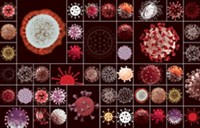Advertisement
Grab your lab coat. Let's get started
Welcome!
Welcome!
Create an account below to get 6 C&EN articles per month, receive newsletters and more - all free.
It seems this is your first time logging in online. Please enter the following information to continue.
As an ACS member you automatically get access to this site. All we need is few more details to create your reading experience.
Not you? Sign in with a different account.
Not you? Sign in with a different account.
ERROR 1
ERROR 1
ERROR 2
ERROR 2
ERROR 2
ERROR 2
ERROR 2
Password and Confirm password must match.
If you have an ACS member number, please enter it here so we can link this account to your membership. (optional)
ERROR 2
ACS values your privacy. By submitting your information, you are gaining access to C&EN and subscribing to our weekly newsletter. We use the information you provide to make your reading experience better, and we will never sell your data to third party members.
Policy
‘How To Survive A Plague’
Activism meets science in this Oscar-nominated documentary
by Jovana J. Grbić
February 14, 2013
| A version of this story appeared in
Volume 91, Issue 7
The history of science movies and the Oscars is not a very long one. Aside from the technical achievement awards, an occasional nomination for acting merits, or the rare sci-fi extravaganza that garners a Best Picture nod, the Academy Awards tend to eschew films with a scientific bent. But this year a documentary that focuses on the interplay of science and activism has received a nomination for Best Documentary Feature. “How To Survive a Plague” is director David France’s stunning account of how activists brought the AIDS epidemic to the attention of the government and science community in the disease’s early days.
“Plague” begins in 1987, with the formation of the AIDS Coalition to Unleash Power (ACT UP) advocacy group, around which the documentary centers. HIV had been identified, isolated, and diagnosed in patients. But as a running ticker throughout the movie reminds us, the AIDS death toll knew no limit. By 1988, 70,000 people had died—a number that would climb to an astonishing 500,000 by 1997.
In those early days, complacency and frustration were the norm among medical professionals, who treated patients with a series of “what the hell” drugs, when they’d even consider treating the patients. The scientific community, although recognizing that research was necessary, devoted little money or manpower. Even early drugs that showed experimental efficacy or relieved symptoms in AIDS patients were dismissed. Scientists and the government were the targets of ACT UP’s fury and protests.
Director and producer: David France
Editing credits: T. Woody Richman, Tyler H. Walk
Principal cast:
Peter Staley
Garance Franke-Ruta
Mark Harrington
Spencer Cox
Larry Kramer
Bill Bahlman
David Barr
Gregg Bordowitz
Gregg Gonsalves
Derek Link
Iris Long
Topic: Science documentary
But by the late ’80s, ACT UP’s mission had reached a critical second phase. Extremists were dismissed to the sidelines, and the group became self-taught scientists, learning all they could about medicine, virology, immunology, and chemistry. The activists showed up at scientific meetings in suits and ties to hand out a well-thought-out proposal on AIDS research and treatment timelines. Impressed scientists took note. By the time charming ACT UP leader Peter Staley addresses an international convention meeting of the American Society for Microbiology, he receives a standing ovation.
“Plague” puts all of the science and medicine of the AIDS crisis in an emotional and historical context. Director France inserts footage of ACT UP protests (the most famous being an all-day takeover in 1990 of the National Institutes of Health), meetings and press conferences, and difficult-to-watch footage of AIDS patients that shines an intimate spotlight of realism on the crisis. As France notes, the AIDS crisis burgeoned concomitantly with the appearance of the camcorder, making early AIDS activists “the very first social movement to shoot a world the dominant culture was ignoring.”
Scientists in the movie range from heroes and antiheroes to ordinary people, which is a rarity in entertainment. By far the biggest hero is Iris Long, a chemist with 20 years of experience in retroviral drug development. Although she knew no one with AIDS and never met a homosexual in her life, Long became a mentor and science adviser to ACT UP. Her fearless leadership and ability to educate the group led to direct reforms at the Food & Drug Administration and NIH.
Other ACT UP members, such as Bill Bahlman (the first to demand a direct drug treatment for AIDS) and Garance Franke-Ruta (a high school dropout and science nerd who became the group’s leading advocate for science-based activism), led the internal change to join forces with scientists rather than fight them. And for every scientist that ignored the AIDS crisis, there was a research pioneer like Anthony Fauci, now head of the National Institute of Allergy & Infectious Diseases, or a Merck chemist leading the development of antiretroviral drugs. Some of the Merck scientists interviewed in the film broke into tears when recollecting the enormity of what they’d accomplished.
In a strangely macabre way, “Plague” is an emotional feel-good story, but one that isn’t over yet. Through the darkest days of rallying an apathetic world, while losing members to the disease, ACT UP’s commitment and perseverance never failed. When surviving members, some of whom professed in the footage that they never expected to live, are revealed as still alive in the film’s last act, the audience feels flooded with gratitude and catharsis.
The science world, which once didn’t know what to make of this emerging virus, took only one year from the time the first protease inhibitor hit the market to come up with and approve the current three-drug treatment cocktail. But the film’s unstated, looming conclusion is that we will never get back the millions of people who died during a decade of silence. And many people continue to perish. The fight for a cure or prevention is not over. And a new plague could always be around the corner.
Jovana J. Grbić is the creative director of Los Angeles-based ScriptPhD, specializing in science communication in entertainment, advertising, and media. She tweets as @ScriptPhD.






Join the conversation
Contact the reporter
Submit a Letter to the Editor for publication
Engage with us on Twitter